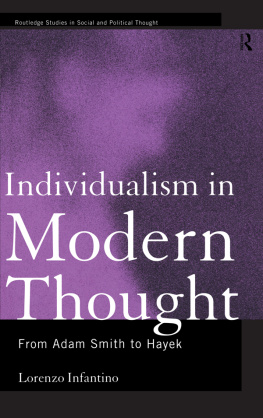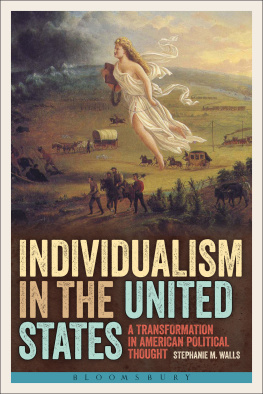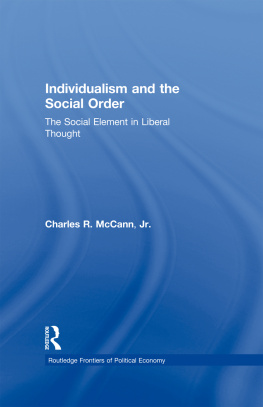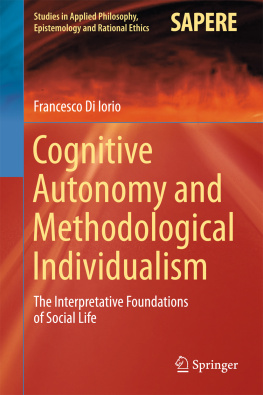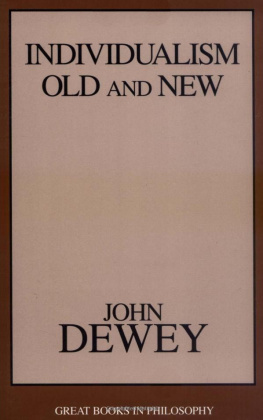INDIVIDUALISM IN MODERN THOUGHT
The usage of 'collective' concepts such as Society, State, Church and Class is essential to both the social sciences and to everyday discourse. But what in reality corresponds to such concepts? Proponents of methodological individualism argue that it is individual human action, with its unintentional and unpredictable consequences, which shapes any collective concept.
Individualism in Modern Thought is a comprehensive survey of methodological individualism in social, political and economic thought from the Enlightenment to the 20th century. Exploring the works of such figures as de Mandeville, Smith, Marx, Spencer, Durkheim, Menger, Simmel, Weber, Mises, Hayek, Popper and Parsons, this study underlines the contrasts between methodological collectivism and methodological individualism. The detailed analysis offered here also reveals the theoretical presuppositions behind the collectivist and individualist traditions and the practical consequences of their applications. Infantino concludes in favour of individualism.
This work touches upon issues in social and political theory, intellectual history, political philosophy, political economy and sociological theory. The relationship between the individual and the constitution of society is of key interest to Infantino, who draws upon the ideas of Hayek to develop his own unique approach to the issues examined.
Lorenzo Infantino is Professor of Sociology at Libera Universit Internazionale degli Studi Sociali, Rome.
ROUTLEDGE STUDIES IN SOCIAL AND POLITICAL THOUGHT
HAYEK AND AFTER
Hayekian liberalism as a research programme
Jeremy Shearmur
CONFLICTS IN SOCIAL SCIENCE
Edited by Anton van Harskamp
POLITICAL THOUGHT OF ANDR GORZ
Adrian Little
CORRUPTION, CAPITALISM AND DEMOCRACY
John Girling
FREEDOM AND CULTURE IN WESTERN SOCIETY
Hans Blokland
FREEDOM IN ECONOMICS
New perspectives in normative analysis
Edited by Jean-Francois Laslier, Marc Fleurbaey, Nicolas Gravel and Alain Trannoy
AGAINST POLITICS
On government, and order
Anthony de Jasay
MAX WEBER AND MICHEL FOUCAULT
Parallel life works
Arpad Szakolczai
THE POLITICAL ECONOMY OF CIVIL SOCIETY AND HUMAN RIGHTS
G.B. Madison
ON DURKHEIM'S ELEMENTARY FORMS
Edited by W. Pickering, W. Watts Miller and N J. Allen
CLASSICAL INDIVIDUALISM
The supreme importance of each human being
Tibor R. Machan
THE AGE OF REASONS
Quixotism, sentimentalism and political economy in eighteenth-century Britain
Wendy Motooka
FORGET LYOTARD?
Edited by Chris Rojek and Bryan S. Turner
INDIVIDUALISM IN MODERN THOUGHT
From Adam Smith to Hayek
Lorenzo Infantino
PROPERTY AND POWER IN SOCIAL THEORY
A study in intellectual rivalry
Dick Pels
WITTGENSTEIN AND THE IDEA OF A CRITICAL SOCIAL THEORY
Giddens, Haberman and Bhaskar
Nigel Pleasants
INDIVIDUALISM IN MODERN THOUGHT
From Adam Smith to Hayek
Lorenzo Infantino

First published 1998
by Routledge
2 Park Square, Milton Park, Abingdon, Oxon, OX14 4RN
Simultaneously published in the USA and Canada
by Routledge
270 Madison Ave, New York NY 10016
Transferred to Digital Printing 2006
1998 Lorenzo Infantino
Typeset in Garamond by Routledge
All rights reserved. No part of this book may be reprinted or reproduced or utilised in any form or by any electronic, mechanical, or other means, now known or hereafter invented, including photocopying and recording, or in any information storage or retrieval system, without permission in writing from the publishers.
British Library Cataloguing in Publication Data
A catalogue record for this book is available from the British Library
Library of Congress Cataloguing in Publication Data
Infantino, Lorenzo, 1948
[Ordine senza piano. English]
Individualism in modern thought: from Adam Smith to Hayek / Lorenzo
Infantino.
(Routledge studies in social and political thought: 14)
Includes bibliographical references and index.
1. Individualism-History. I. Title. II. Series.
HM136.I46513 1998
302.5'4'09-dc21 97-52179
CIP
ISBN 0415185246
TO MY PARENTS
CONTENTS
One of the errors most frequently committed within the social sciences is the reification of collective concepts. We can clarify this question by means of some points made by Gaetano Salvemini. After presenting a particular 'collection' of facts as an illustration, he wrote:
We give them a single name: 'The French Revolution'; which enables us to bring to mind the complex picture of events without having to repeat the details in order every time. But the use of personal, concrete names has made us so used to seeing a real entity behind each name that we very often end up by personifying collective and abstract names also. In the same way that we think of illness as a concrete entity existing outside and above the sick person, so we treat the Revolution as something existing outside and above the people who lived in the Revolutionary period.
Salvemini added:
There is nothing to stop us from saying that the Revolution destroyed feudal rights, as long as we remember that these words mean that, after the fall of the Bastille, the peasants no longer wanted to pay feudal dues, the Deputies of the Constituent Assembly did not succeed in making people observe them, the members of the Legislative Assembly almost entirely abolished them by law, those of the Convention completed the work of taking away their force by law.
Salvemini explained that the danger begins when we make the Revolution operate 'like a person of flesh and blood, like a historical occurrence distinct from events and creator of those same events'.
Hence, the problem lies not in whether but in how to use collective concepts. We need them, because they are the shorthand that enables us to communicate with great immediacy and economy of time, but they are not entities endowed
However, the reification of collective concepts is a widespread practice. Society, the State, the Church, class, race, party, and many other Kollectivebegriffe are used by the cultural tradition that goes by the name of methodological collectivism, as if they had a reality independent of individuals and individual actions, to which we intend to refer concisely. This is an obstacle to the understanding of social events, and in particular of the birth and development of norms and institutions. In fact, as soon as autonomous reality is bestowed on collective concepts, they become a force, itself also autonomous, which leads to the consideration of the actions of individuals in terms of effects and never of causes.
It is not understood that society, as Georg Simmel maintained, is an 'inner bond' of the relationship of interaction that individuals bring into being;
Therefore, only people exist. They act on the basis of ideas, norms, beliefs; and they bring about intentional and unintentional results. If human actions generated only the desired consequences, there would be no need for social sciences: the intentions of the actors would already make everything clear. But we act outside ourselves, always measuring ourselves against the other, and this comparison produces a 'cascade' of unforeseeable events.
In other words, the origins and development of social norms are not the consequence of the intervention of mysterious forces. They are the result of human actions. But it is often a matter of unintentional or unintended results of actions directed towards other goals; and even if one is in the presence of results which were consciously pursued, this does not exclude the possibility that they may in their turn produce unprogrammed social consequences. This shows, among other things, how necessary it is to free oneself from every claim to omniscience, from that presumptuousness which often leads to belief in the myth of the great Legislator or Planner who, sure of his ability to bend the situation to his own designs, aims at moulding and remoulding norms and institutions intentionally. This is the myth of the collectivistic tradition which, as Friedrich A. von Hayek emphasised, was unfortunately shared by the utilitarian tradition, from Bentham to the theory of general economic equilibrium and beyond.

